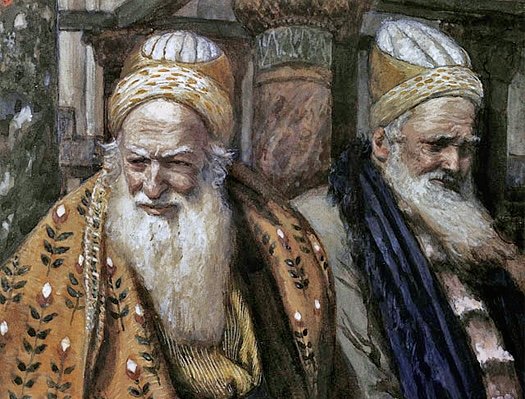
Jesus has just been up on a mountain with Peter, James, and John. There, God has spoken to them, affirming Jesus’ authority and telling the disciples to listen to Him. During that time, the prophets Moses and Elijah have appeared and talked with Jesus, and His face and clothing have been transformed. After that, Jesus and His three disciples have descended the mountain and rejoined the rest of the disciples, who are surrounded by a waiting crowd.
When they came to the crowd, a man came up to Jesus, falling on his knees before Him and saying, “Lord, have mercy on my son, because he has seizures and suffers terribly; for he often falls into the fire and often into the water. And I brought him to Your disciples, and they could not cure him.”
And Jesus answered and said, “You unbelieving and perverse generation, how long shall I be with you? How long shall I put up with you? Bring him here to Me.”
And Jesus rebuked him, and the demon came out of him, and the boy was healed at once.
Then the disciples came to Jesus privately and said, “Why could we not cast it out?”
And He said to them, “Because of your meagre faith; for truly I say to you, if you have faith the size of a mustard seed, you will say to this mountain, ‘Move from here to there,’ and it will move; and nothing will be impossible for you. But this kind does not go out except by prayer and fasting.”
(Matthew 17:14-21)
The thing that catches my attention in this vignette is Jesus' response to the father's request.
"You unbelieving and perverse generation," He exclaims.
Is this a general comment, or is it directed against someone specific? To figure this out, let’s examine the people mentioned.
- General
Jesus wasn’t given to general criticism or ranting in the manner that’s so common today. Throughout the Gospels, we read about Jesus in a variety of situations—tired, angry, hungry, discouraged—but He never lost control. If he had a criticism, it always seemed to be directed at a particular person or group of people. It was never unfocused. There must be something else going on.
- The Boy’s Father
This seems unlikely. Within Jesus’ statements, He asks the question, “How long?” This implies that the person or people He’s addressing have been with Jesus for quite some time. The father hasn't always been with Jesus, so this “how long” doesn’t appear to apply to him.
- The Disciples
During His ministry, Jesus did get exasperated with His disciples at times—usually for their slowness to understand [1] and their hardness of heart [2].
But again, that doesn’t seem to be the case here. While they were descending the mountain, Peter, James, and John had many questions about Jesus and Elijah—questions that demonstrated a lack of understanding on some of His previous teachings. Yet, Jesus had been patient with their questions. It seems unlikely that His manner would have suddenly become less patient towards the other disciples.
Later on, the disciples privately asked, “Why could we not cast [the demon] out?” In Jesus’ reply there seems to be a nuance that until Jesus told them, they hadn’t known that they should fast and pray to remove this kind of demon.
The Scriptures do record other times when Jesus demonstrated incredulity over His disciples’ slowness of spirit, but this was always after He had taught them something that they failed to understand—not when they hadn’t yet learned something. Following those other instances of exasperation, the disciples would hesitate to approach Him with further questions that would showcase their lack of understanding. [3]
But that’s not what we see here. The disciples’ eagerness to approach Jesus privately with their question only makes sense if Jesus’ original chastisement was not aimed at them—and they knew it.
So where are we now? We’ve eliminated the father and the disciples. We know Jesus would not have chastised the one afflicted by the demon. He never did that. There’s only one group left.
- The Crowd
This is where things get interesting. To paraphrase Sherlock Holmes, if we’ve eliminated all other possibilities, then whatever remains is likely to be the answer.
Let’s imagine for a moment that Jesus’ outburst was aimed at the multitude who had gathered. They’d seen the disciples fail in their attempts to remove the demon. Now, perhaps they were wondering if Jesus had met His match and would fail, too.
For the Pharisees in the crowd, the possibility of schadenfreude—taking pleasure in someone else’s failure—would have been very high. We’ve all seen this murky underside of the human psyche at work countless times in our own experience.
But Jesus knew what was in the crowd’s heart. He rebuked it—the evil of watching someone else’s pain and being entertained by it. He couldn’t let that stand. Because Jesus never ignores evil. He never becomes overwhelmed by it. He never lets it shut Him down. He stands up for justice and mercy.
“Lord, have mercy on my son,” the father begged.
And Jesus’ first act of mercy came before He healed the boy. His mercy first took the form of rebuking the crowd.
Lord God, I come to you in repentance for those times when I’ve taken pleasure in the suffering and failures of the people You love. Jesus, please forgive me for my sin of schadenfreude. Please cleanse my heart and enable me to adopt a loving orientation towards people, rather than one of bloodthirsty entertainment. Please purge my heart and tongue of gossip and malice and enable me to be filled with Your Holy Spirit, a pure heart and mind, and contentment with my own life without having to disparage other people. In Jesus’ name I pray, amen.
NOTES
[1] See Luke 18:24, 24:25; Matthew 16:8–12.
[2] See Mark 6:52.
[3] See Mark 9:32, Matthew 16:7.










